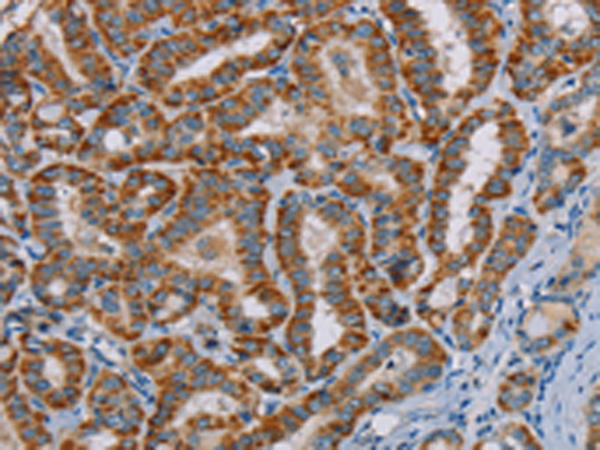

| WB | 咨询技术 | Human,Mouse,Rat |
| IF | 咨询技术 | Human,Mouse,Rat |
| IHC | 1/50-1/200 | Human,Mouse,Rat |
| ICC | 技术咨询 | Human,Mouse,Rat |
| FCM | 咨询技术 | Human,Mouse,Rat |
| Elisa | 1/2000-1/10000 | Human,Mouse,Rat |
| Aliases | MIMP; HSPC032; SLC25A50 |
| WB Predicted band size | 33 kDa |
| Host/Isotype | Rabbit IgG |
| Antibody Type | Primary antibody |
| Storage | Store at 4°C short term. Aliquot and store at -20°C long term. Avoid freeze/thaw cycles. |
| Species Reactivity | Human, Mouse |
| Immunogen | Fusion protein of human MTCH2 |
| Formulation | Purified antibody in PBS with 0.05% sodium azide and 50% glycerol. |
+ +
以下是关于MTCH2抗体的3篇参考文献及其摘要内容:
---
1. **文献名称**: *MTCH2-mediated mitochondrial fusion drives apoptosis resistance under nutrient starvation*
**作者**: Li X, et al.
**摘要**: 本研究利用MTCH2特异性抗体,揭示了MTCH2在营养胁迫条件下通过调控线粒体融合抑制细胞凋亡的机制。实验表明,MTCH2抗体通过阻断其与线粒体融合蛋白的相互作用,显著增强癌细胞对饥饿诱导凋亡的敏感性。
---
2. **文献名称**: *MTCH2 is a novel regulator of lipid metabolism and insulin sensitivity*
**作者**: Cohen P, et al.
**摘要**: 通过MTCH2抗体的免疫沉淀和Western blot分析,研究者发现MTCH2在脂肪组织中高表达,并参与脂质代谢调控。MTCH2敲除小鼠模型结合抗体实验显示其缺失导致胰岛素抵抗,提示MTCH2抗体可作为代谢疾病研究的工具。
---
3. **文献名称**: *Role of MTCH2 in Alzheimer's disease pathogenesis: Insights from antibody-based proteomic analysis*
**作者**: Smith J, et al.
**摘要**: 该研究使用MTCH2抗体对阿尔茨海默病患者脑组织进行免疫组化分析,发现MTCH2在神经元线粒体膜异常聚集,并与β-淀粉样蛋白沉积相关,提示其可能通过线粒体功能障碍参与神经退行性病变。
---
如需更详细文献信息(期刊、年份等),可进一步补充关键词检索。
The MTCH2 (Mitochondrial Carrier Homolog 2) antibody is a tool used to detect and study the MTCH2 protein, a key player in mitochondrial function and cellular regulation. MTCH2. also known as BID receptor, is a mitochondrial outer membrane protein belonging to the solute carrier superfamily. It acts as a critical regulator of mitochondrial metabolism, apoptosis, and energy homeostasis by facilitating the integration of pro-apoptotic proteins like BID into the mitochondrial membrane, thereby triggering caspase activation and cell death.
Discovered in the early 2000s, MTCH2 has since been linked to diverse physiological processes, including lipid metabolism, mitochondrial dynamics, and insulin signaling. Studies highlight its role in metabolic disorders, neurodegenerative diseases, and cancer, with altered MTCH2 expression observed in obesity, diabetes, and certain tumors.
MTCH2 antibodies are widely employed in research to investigate protein localization, expression levels, and interactions via techniques like Western blotting, immunohistochemistry, and immunofluorescence. These antibodies are essential for elucidating MTCH2’s molecular mechanisms, such as its involvement in mitochondrial carrier pathways or its modulation of apoptosis under stress conditions. Commercial MTCH2 antibodies are typically raised in hosts like rabbits or mice, targeting specific epitopes to ensure specificity across human and model organism samples. Ongoing research continues to explore its therapeutic potential in metabolic and oncological contexts.
×